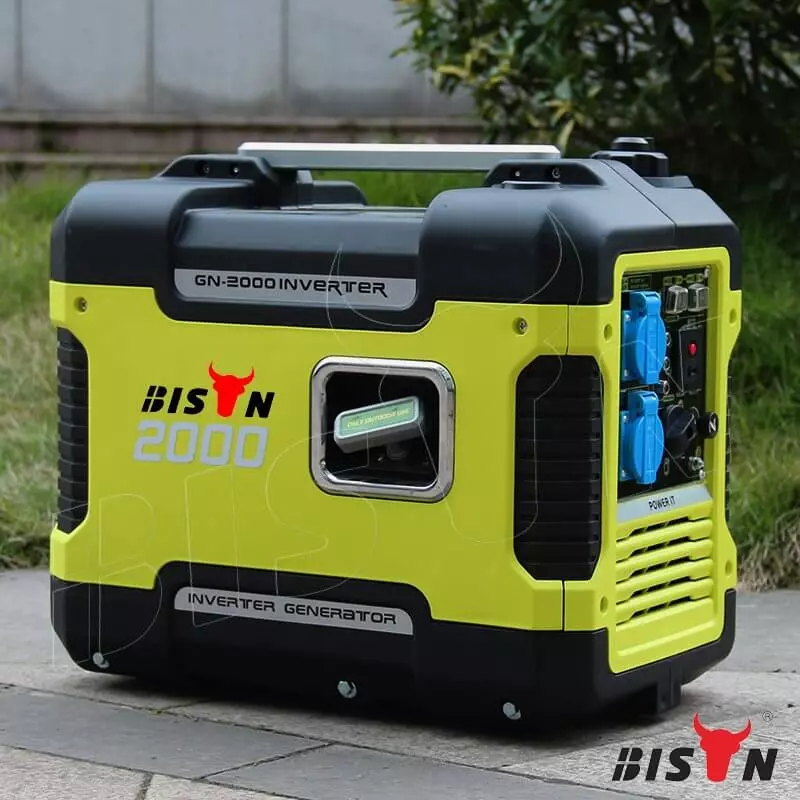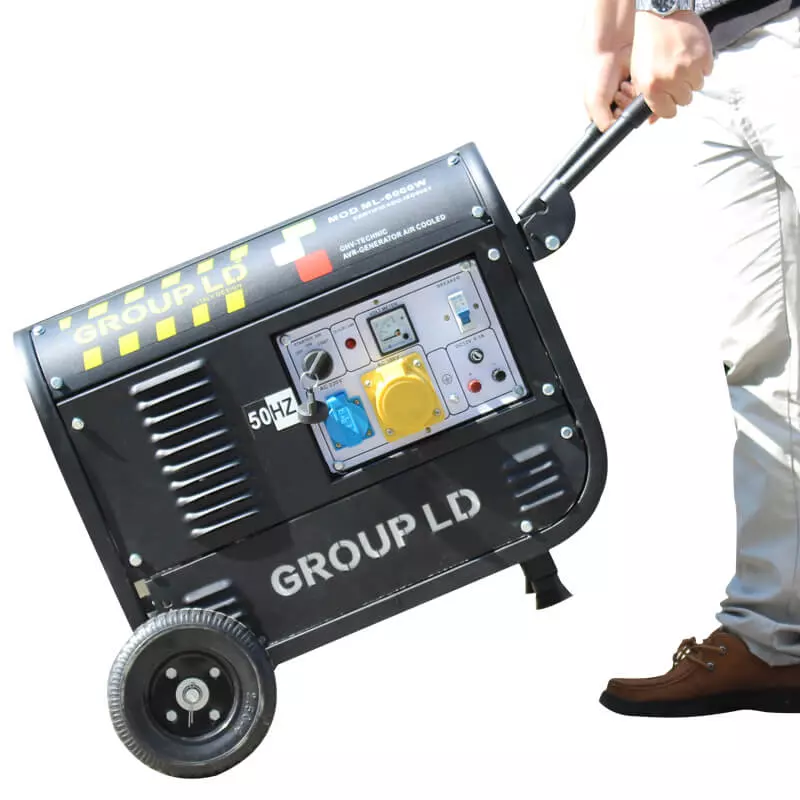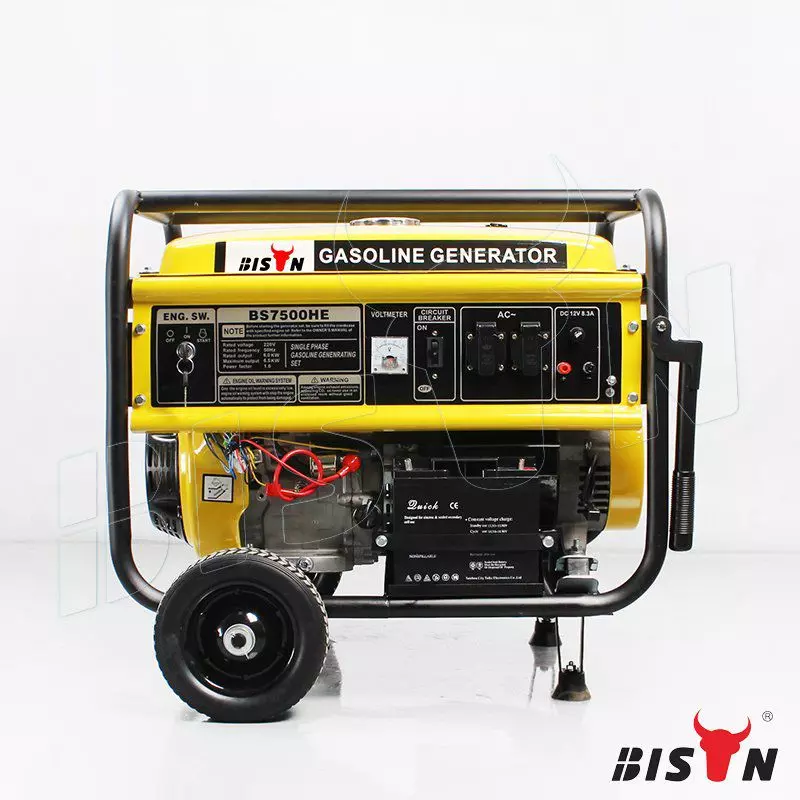How to maintain a generator (11 Easy generator maintenance tips)
2022-10-19
Table of content

Maintaining your generator, like any other appliance in your house, reduces the likelihood of malfunctioning or requiring urgent repairs. Your generator will perform better and last longer if you pay more attention to it. Did you know that a generator with routine maintenance will last twice as long as one without it?
11 tips for maintaining a generator
#1. Review the owner's guide.
I cannot stress enough how different any maintenance you perform will be depending on the particular equipment you have. It is crucial to keep and read your owner's manual for this reason. It has model-specific data that will enable your generator to operate and perform at its peak efficiency.
#2. Conduct a visual inspection of the outside
Inspecting your equipment is the first step needed to determine the state of your generator. Make sure the area around the equipment is not overgrown with vegetation and leave enough space for a clear working radius.
#3. Conduct a visual inspection of the interior
Then carefully inspect the interior of the unit visually. Check the generator housing for any warning signs of trouble, ensure the hoses and wiring are in good shape and ensure the generator is dry and clean. This is by far the simplest action a homeowner can take, and it should be done frequently to spot any issues before they worsen.
#4. Replace oil
Oil changes are one of the most crucial aspects of generator maintenance. Several factors, such as the following, will determine how frequently you should change the oil:
The brand of the generator you have
Exactly how often do you use your generator
What type of environment the generator operates in
Based on the abovementioned factors, BISON advise changing the oil every 50 to 200 hours of operation. For instance, because newer, cutting-edge models burn cleaner than older ones, they might need fewer oil changes. However, you might need to increase the frequency of oil changes if your generator operates in a neighbourhood with a lot of dust or other contaminants that can mix with the oil.
Additionally, if your generator is brand-new, it's typical for manufacturers to advise an oil change eight hours into the operation. You can protect your generator from contaminants that might have entered your system during manufacturing or shipping by changing the oil right away.
#5. Make sure it's clean
The rotor and stator, two components found inside your generator, cooperate to produce electricity in a generator. Rotors and stators frequently collect dust, debris, and other contaminants while they are in use.
Your rotor and stator won't produce energy as effectively if you let your generator accumulate too much dirt. You'll probably burn the two components out more quickly than usual as well.
It would help if you cleaned the air filters in your generator to get rid of debris. Additionally, it's also advised to inspect the air filter for dust once a week, regardless of how frequently you use your generator.
Increase the frequency of your generator checks if you live in an especially dusty area. By taking these precautions, you can be sure that your generator will be ready when you need it most.
#6. Run it
Since generators are generally used as a backup measure, it may be months or even years before you need to turn them on. But what if your generator breaks down just when you need it?
Avoid putting yourself in this predicament. Instead, turn on your generator once a month to make sure oil is being used to lubricate it.
#7. Give it a try
When testing their generators, homeowners can adhere to a set of guidelines developed by the National Fire Protection Agency (NFPA). NFPA 70 should be followed for non-critical generators, such as those that homeowners occasionally use to charge their devices during a power outage.
According to NFPA 70, generators must undergo a 30-minute test every month at 30% to 50% of their maximum load.
#8. Avoid using old gasoline
It's possible that the majority of homeowners are unaware that they should empty the fuel from their generator's tank after each use. By clearing the tank, you can make sure that you're using clean, efficient fuel and that your equipment is safe from deterioration and damage.
Invest in a generator that is simple to refuel whenever necessary rather than relying on outdated fuel. For instance, propane-powered generators can make use of home delivery services, giving you access to supplies in an emergency without having to look for fuel.
#9. Keep it securely
You must exercise some caution after each use if you want to prolong the lifespan of your portable generator. Double-check that the fuel lines are empty in addition to emptying the fuel tank. To stop rusting and lengthen the life of your equipment, keep it in a cool, dry place.
Homeowners may want to think about investing in accessories like tents, covers, and generator sheds.
To prevent untimely repairs, each of these tools helps you store and safeguard your portable generator.
#10. Inspect filters and plugs

Without a way to breathe and a way to ignite the gas in the engine's cylinders, your generator would be useless. At least once at the beginning of each season, you should swap out your spark plug and air filter after 200 hours of operation. A fresh spark plug and a clean air filter will guarantee the right fuel-air ratio, enhancing engine performance and extending the life of your generator.

#11. When maintaining your generator, test the batteries.
Failures of standby power systems frequently result from weak or undercharged starting batteries. To prevent dwindling, the battery must be kept fully charged and maintained. This requires routine testing and inspection to determine the battery's current condition and prevent any problems with the generator's start-up. Additionally, they need to be cleaned, and the battery's specific gravity and electrolyte levels need to be checked regularly.
a) Battery evaluation
It is insufficient only to check the batteries' output voltage to determine whether they can provide sufficient starting power. The accurate way to measure terminal voltage is to apply a load because as batteries get older, their internal resistance to current flow increases. This indicative test may be run automatically each time the generator starts on some generators. Check the condition of each starting battery on other generator sets using a manual battery load tester.
b) Battery maintenance
When dirt seems excessive, wipe down the batteries with a damp cloth to keep them clean. Remove battery cables and clean the terminals with baking soda and water solution if there is corrosion around the terminals. When finished, flush the batteries with fresh water to remove any remaining solution from the battery cells. Apply a thin layer of petroleum jelly to the terminals after replacing the connections.
c) Determining specific gravity
Use a battery hydrometer to determine the specific gravity of the electrolyte in each battery cell in open-cell lead-acid batteries. A fully charged battery has a specific gravity of 1.260. If the specific gravity reading is less than 1.215, charge the battery.
d) Monitoring the electrolyte level
At least every 200 hours of operation, open-cell lead-acid batteries should have their electrolyte levels checked. If low, add distilled water until the filler neck of the battery cells is full. When not in use, always disconnect the generator's batteries.
FAQs
1) How do I check my oil level?
Find the dipstick, then take it out. Determine the dipstick's full mark and the oil line's oil level to determine how full the oil tank is. If more oil is required, add until the dipstick reaches the indicated mark, being careful not to overfill. To prevent further generator maintenance, change the oil per the manufacturer's advice.
2) What kind of oil should I add to the engine?
Depending on the specifications of the engine manufacturer, this question. In general, high-quality 30 weight detergent is suitable for summer conditions, and high-quality 10W 30 is suitable for winter conditions. For specific oil recommendations, please consult your engine manual.
3) Should I turn on my generator if I have not used it for a while?
Yes, performing this preventive maintenance on your generator is among the easiest things you can do. It's a good approach to run a generator occasionally while it's under load. Running it once a month will stop gas from sticking to carburettor gum.
4) Do I need to remove the gasoline before storing my generator?
When you are storing your generator for an extended period, especially if you intend to store it indoors, it is always a good idea to remove the gasoline. It's never a good idea to keep flammable items inside your house.
5) Is using a fuel stabilizer necessary?
Gas storage in a generator is not recommended, as was already stated. A fuel stabilizer is a good idea if you are storing gas for your generator in a can. Always keep in mind not to store gas in confined areas like your home or car.
6) When should I change my spark plugs?
Again, different manufacturers will offer various maintenance advice for generators, but the majority will state something along the lines of "every 100 hours or once a year." If a spark plug is worn out and cracked, you might also need to replace it. To verify this:
Disconnect the wire
Before removing the old spark plug, clean the area around it to avoid debris falling inside.
To remove the outdated spark plug, use a spark plug socket.
With a spark plug cleaner and wire brush, clean the spark plug. Replace the porcelain if there are any lingering stains or cracks.
When replacing a spark plug, it's crucial to use a spark plug gauge to set the electrode gap to the manufacturer's specifications. You can swap out the spark plug and reattach the wire once the gap is properly set.
7) Where should I keep my generator when I'm not using it?
The best location for storing your generator is somewhere that is protected, dry, clean, and away from sparks and flames. Before storing, don't forget to drain the fuel and oil the spark plug holes.
Conclusion
You can keep your generator in good working order for decades if you adhere to these recommendations. Most importantly, it results in future cost savings.
Do you still have concerns?
BISON is on hand to assist. We offer a range of generators for both domestic and business use. If you need assistance purchasing a generator, please let us know.
Get answers to your questions about generators by contacting our team online or by phone at (+86) 13625767514 today. We'll support you in using your generator to safely power your residence or place of business.




